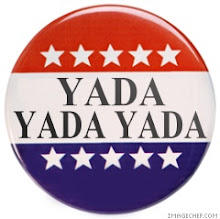"What about freedom of speech?" asked the less than candid Candidate. "Well what it gets into then is if you decide that restaurants are publicly owned and not privately owned, then do you say that you should have the right to bring your gun into a restaurant even though the owner of the restaurant says 'well no, we don't want to have guns in here' the bar says 'we don't want to have guns in here because people might drink and start fighting and shoot each-other?'" Paul replied. "Does the owner of the restaurant own his restaurant? Or does the government own his restaurant? These are important philosophical debates but not a very practical discussion."Unfortunately, more than just being grammatically confused, he's wrong. He's equivocating and the debate is, of course, entirely about practical matters. Can we agree, for instance, that being black in a restaurant is fundamentally different than carrying a gun in a bar and if so, his analogy is defective and a fallacy of distraction? Certainly a speed limit is not Government ownership of my car, health regulations imposed on food producers aren't the equivalent of owning the family farm nor is forcing Woolworth to stop creating two Americas with their policies isn't Marxism.
Is the government of and by the people allowed,as the founding documents imply, to promote liberty for all, to promote peace and domestic tranquility by imposing limitations on individual behavior? Is he arguing for a government so impotent it must inevitably fall into feudalism and exploitation? Those are the questions he begs and the questions he avoids. Sorry Doctor, I think the balance between individual liberty and being a free country is a practical and necessary discussion.
Is it practical to have a society so far beyond the control of its members that justice becomes only a matter of the will of the strongest and the richest and most well connected -- the will of the WASP? No, unlimited individual license does not allow for a society at all, much less a free one.
Still it's all about the practical as opposed to the relentlessly repeated and self referential principle and we've all heard of or can easily come up with examples where freedom cannot be unlimited for many reasons; where behavior that needs to be restrained cannot be restrained by anyone other than Government. Is it preferable to allow my neighbors to forbid Baptists to live on my block and ignore my freedom or is it better to protect the minority against the majority, which is a common definition of democracy as distinguished from mob rule. No, if this is but a "philosophical" discussion it's because he doesn't want to address the inevitable questions Libertarians invite when they refuse to discuss its inherent limitations.
The traditional 'best government is least government' trope reduces to absurdity all by itself as quickly as does his argument that any restraints or obligations put on behavior or business practices constitute ownership and are an unnecessary stain on the pure and absolute freedom we've somehow decided is our birthright. Certainly although he assures us that he would never patronize a business that discriminates, he realizes that his sentiments are not universal. He realizes that he's giving license to anyone to debase any group he likes and to diminish their lives, their liberty and their pursuit of happiness. He realizes that such a nation as he dreams of would be fractured, Balkanized, a loose, weak, unstable confederation of hostile groups no more pleasant than a baboon troupe and with each of us at his neighbor's throat. He must realize that he's appealing to bigots, racists and sociopaths of no conscience -- and all in the name of principle and freedom.
So why is he debating as though the balance between too much and not enough wasn't worth discussing? As though that wasn't the real question? Perhaps its because he's pandering to an audience somewhat less rational than Ron Paul's: to an audience whipped into irrational fury by the basic requirements of civilization; too hungry for revenge against a maturing world and too angry and self centered to give a damn what he can do for his country.

2 comments:
i think u put it very well, but i doubt his audience is very different from his dad's.
as far as i'm concerned, my rights end where they start to impinge on somebody else's. it's not too different from 'live & let live.' i'm not sure libertarians have yet discovered the distinction between selfishness and enlightened self-interest.
even adam smith allowed for some govt regulation.
Thanks. For what it's worth some of them are calling Ol' Adam a Commie.
Teddy Roosevelt too -- and Eisenhower.
Perhaps reason itself is proof of communism.
Post a Comment